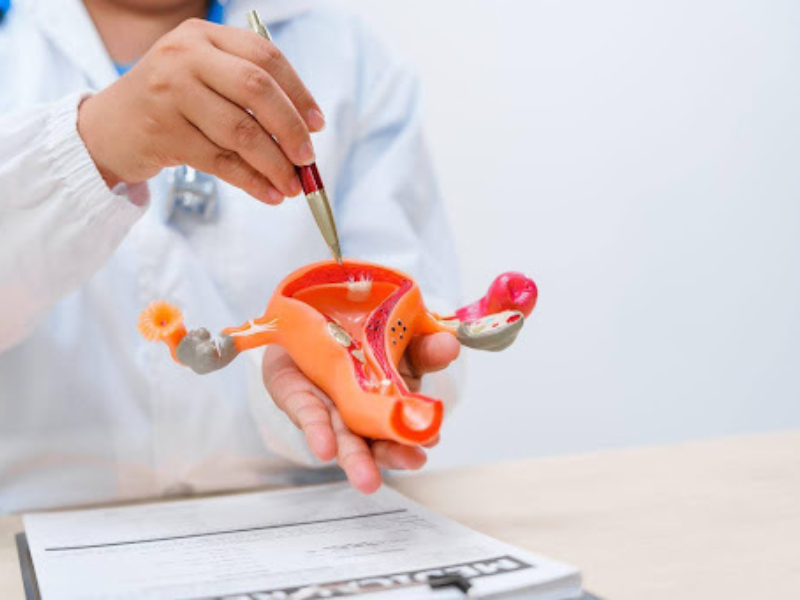PCOS in Menopause: How to Manage the Double Hormonal Challenge!

PCOS in Menopause: How to Manage the Double Hormonal Challenge!
PCOS and Menopause: What Every Woman Should Know
Polycystic Ovary Syndrome (PCOS) and menopause are two distinct but interconnected phases in a woman’s life. Both involve significant hormonal changes that can affect physical, emotional, and mental health. Understanding how these two conditions interact is crucial for women navigating these complex stages, especially as they age.




Understanding PCOS: A Lifelong Condition
Polycystic Ovary Syndrome (PCOS) is a common endocrine disorder that affects 1 in 10 women of reproductive age. Characterized by a range of symptoms, including irregular menstrual cycles, excessive androgen levels, and polycystic ovaries, PCOS can have far-reaching effects on a woman’s health. The exact cause of PCOS is still not fully understood, but it is believed to involve a combination of genetic and environmental factors.Symptoms of PCOS
The symptoms of PCOS vary widely from woman to woman, but common manifestations include:- Irregular Periods: Women with PCOS often experience infrequent, prolonged, or absent menstrual cycles.
- Excess Androgen Levels: High levels of male hormones can lead to hirsutism (excessive hair growth), acne, and male-pattern baldness.
- Polycystic Ovaries: Enlarged ovaries with numerous small cysts are often found in women with PCOS, although not all women with the syndrome have these cysts.
- Weight Gain: Many women with PCOS struggle with weight gain, particularly around the abdomen.
- Insulin Resistance: A significant number of women with PCOS have insulin resistance, which can increase the risk of type 2 diabetes.

Long-Term Health Risks of PCOS
PCOS is not just a reproductive issue; it is a lifelong condition that can increase the risk of several chronic diseases. Women with PCOS are at higher risk for:- Type 2 Diabetes: Due to insulin resistance, women with PCOS have a higher likelihood of developing type 2 diabetes.
- Cardiovascular Disease: PCOS is associated with an increased risk of heart disease, particularly due to factors like obesity, insulin resistance, and dyslipidemia.
- Endometrial Cancer: The irregular shedding of the uterine lining in women with PCOS increases the risk of endometrial cancer.

Menopause: The End of Reproductive Years
Menopause marks the end of a woman’s reproductive years and is defined as the absence of menstruation for 12 consecutive months. It typically occurs between the ages of 45 and 55, with the average age being 51. Menopause is a natural biological process, but the transition, known as perimenopause, can bring about a variety of symptoms due to fluctuating hormone levels.Symptoms of Menopause
The symptoms of menopause can vary greatly in intensity and duration. Common symptoms include:- Hot Flashes: Sudden feelings of warmth, often intense, that spread over the body and are sometimes accompanied by sweating and redness.
- Night Sweats: Episodes of excessive sweating during sleep, which can disrupt rest and lead to fatigue.
- Mood Changes: Many women experience mood swings, irritability, or depression during menopause.
- Vaginal Dryness: The decrease in estrogen can lead to vaginal dryness, discomfort, and pain during intercourse.
- Sleep Problems: Insomnia and disrupted sleep are common complaints during menopause.
- Weight Gain: Many women gain weight during menopause, particularly around the abdomen.
The Intersection of PCOS and Menopause
As women with PCOS approach menopause, the interaction between these two conditions can create a unique set of challenges and considerations.Hormonal Changes
Both PCOS and menopause involve significant hormonal fluctuations. Women with PCOS often have higher levels of androgens (male hormones) and insulin resistance, which can complicate the hormonal changes that occur during menopause.- Androgens and Menopause: While androgen levels typically decline with age, women with PCOS may still have higher levels of these hormones even after menopause, leading to ongoing symptoms like hirsutism and male-pattern baldness.
- Insulin Resistance: The insulin resistance seen in PCOS can worsen with age, particularly as women become more prone to weight gain during and after menopause. This can increase the risk of developing type 2 diabetes and cardiovascular disease.
Menstrual Changes
Women with PCOS often experience irregular menstrual cycles throughout their reproductive years. As they approach menopause, these irregularities can persist, making it difficult to predict the onset of menopause. Some women with PCOS may continue to have occasional periods well into their late 40s or early 50s, while others may experience a sudden cessation of menstruation.Weight Management
Weight gain is a common concern during both PCOS and menopause. The hormonal changes associated with menopause, particularly the decline in estrogen, can lead to an increase in abdominal fat. For women with PCOS, who may already struggle with weight management, this can exacerbate the risk of obesity and related health issues like insulin resistance and cardiovascular disease.
- PCOS and Menopause Diet: Maintaining a healthy diet and regular exercise routine is crucial for managing both PCOS and menopausal symptoms. A diet rich in whole foods, low in refined sugars, and high in fiber can help manage insulin levels and reduce the risk of weight gain.
- Metabolic Health: Women with PCOS should focus on maintaining good metabolic health as they approach menopause. Regular monitoring of blood sugar levels, cholesterol, and blood pressure is important to reduce the risk of diabetes and heart disease.
Mental Health
The hormonal fluctuations associated with both PCOS and menopause can take a toll on mental health. Women with PCOS are already at an increased risk for anxiety and depression, and these conditions can be exacerbated by the changes of menopause.- Mood Swings and Depression: The decline in estrogen during menopause can lead to mood swings, irritability, and depression. For women with PCOS, who may already be prone to these issues, this can create a significant mental health challenge.
- Support Systems: Building a strong support system, including healthcare providers, mental health professionals, and peer support groups, can be crucial for managing the mental health aspects of PCOS and menopause.

Managing PCOS During Menopause
Navigating the intersection of PCOS and menopause requires a comprehensive and individualized approach. Women with PCOS should work closely with their healthcare providers to develop a management plan that addresses the unique challenges they face as they approach and go through menopause.Hormone Replacement Therapy (HRT)
Hormone Replacement Therapy (HRT) is a common treatment for managing the symptoms of menopause. However, for women with PCOS, the decision to use HRT should be made carefully, considering their risk factors.- Benefits and Risks: HRT can help alleviate symptoms like hot flashes, vaginal dryness, and mood swings, but it may also carry risks, particularly for women with a history of insulin resistance, cardiovascular disease, or endometrial hyperplasia. Women with PCOS should discuss the potential benefits and risks of HRT with their healthcare provider.
- Alternative Treatments: For women who cannot or choose not to use HRT, there are alternative treatments available. Lifestyle changes, such as diet and exercise, as well as non-hormonal medications, can help manage symptoms.
Monitoring and Managing Chronic Conditions
As women with PCOS approach menopause, it becomes increasingly important to monitor and manage chronic conditions that may be exacerbated by the hormonal changes of menopause.- Cardiovascular Health: Regular check-ups to monitor blood pressure, cholesterol levels, and heart health are essential. Lifestyle modifications, such as quitting smoking, reducing alcohol intake, and maintaining a healthy weight, can also reduce the risk of heart disease.
- Diabetes Prevention: Women with PCOS should continue to monitor their blood sugar levels and take steps to prevent the development of type 2 diabetes. This may include dietary changes, regular exercise, and medications like metformin, if necessary.
PCOS Symptoms After Menopause
While menopause typically brings an end to the menstrual cycle, the symptoms of PCOS may persist even after menopause. Women with PCOS may continue to experience symptoms such as hirsutism, insulin resistance, and weight gain long after their reproductive years have ended. Additionally, the risk of developing chronic conditions like diabetes and cardiovascular disease remains elevated in postmenopausal women with PCOS. Managing Postmenopausal Symptoms for women with PCOS, managing symptoms after menopause requires a focus on long-term health and wellness. This includes a continued emphasis on a healthy diet, regular exercise, and monitoring for chronic conditions.Conclusion: Embracing the Journey
The intersection of PCOS and menopause is a unique and challenging phase in a woman’s life, but it can also be an opportunity for growth and self-care. By understanding the complex relationship between these two conditions, women can take proactive steps to manage their health and well-being as they navigate this transition. Empowerment through knowledge, support from healthcare providers, and a commitment to healthy lifestyle choices can help women with PCOS not only survive but thrive during menopause. With the right approach, this stage of life can be a time of renewed vitality, self-discovery, and fulfillment.Citations

Sruthakeerthi Shenoy
Sruthakeerthi is an experienced content writer known for her engaging and informative writing. She stays updated with the latest insights to create accurate and empathetic content. Working closely with menopause warriors, she crafts engaging and informative pieces that support and inspire women on their perimenopause and menopause journey.
Facebook
LinkedIn
X | Twitter
WhatsApp

Sruthakeerthi Shenoy
Sruthakeerthi is an experienced content writer known for her engaging and informative writing. She stays updated with the latest insights to create accurate and empathetic content. Working closely with menopause warriors, she crafts engaging and informative pieces that support and inspire women on their perimenopause and menopause journey.
View All Posts >




